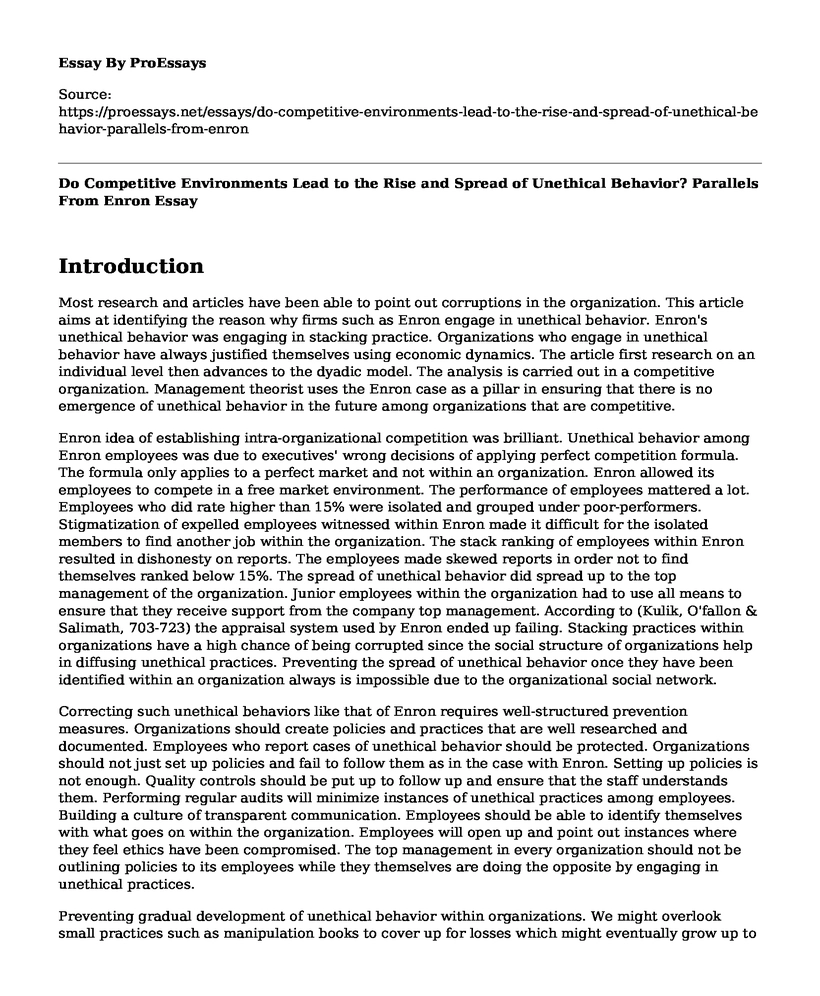Introduction
Most research and articles have been able to point out corruptions in the organization. This article aims at identifying the reason why firms such as Enron engage in unethical behavior. Enron's unethical behavior was engaging in stacking practice. Organizations who engage in unethical behavior have always justified themselves using economic dynamics. The article first research on an individual level then advances to the dyadic model. The analysis is carried out in a competitive organization. Management theorist uses the Enron case as a pillar in ensuring that there is no emergence of unethical behavior in the future among organizations that are competitive.
Enron idea of establishing intra-organizational competition was brilliant. Unethical behavior among Enron employees was due to executives' wrong decisions of applying perfect competition formula. The formula only applies to a perfect market and not within an organization. Enron allowed its employees to compete in a free market environment. The performance of employees mattered a lot. Employees who did rate higher than 15% were isolated and grouped under poor-performers. Stigmatization of expelled employees witnessed within Enron made it difficult for the isolated members to find another job within the organization. The stack ranking of employees within Enron resulted in dishonesty on reports. The employees made skewed reports in order not to find themselves ranked below 15%. The spread of unethical behavior did spread up to the top management of the organization. Junior employees within the organization had to use all means to ensure that they receive support from the company top management. According to (Kulik, O'fallon & Salimath, 703-723) the appraisal system used by Enron ended up failing. Stacking practices within organizations have a high chance of being corrupted since the social structure of organizations help in diffusing unethical practices. Preventing the spread of unethical behavior once they have been identified within an organization always is impossible due to the organizational social network.
Correcting such unethical behaviors like that of Enron requires well-structured prevention measures. Organizations should create policies and practices that are well researched and documented. Employees who report cases of unethical behavior should be protected. Organizations should not just set up policies and fail to follow them as in the case with Enron. Setting up policies is not enough. Quality controls should be put up to follow up and ensure that the staff understands them. Performing regular audits will minimize instances of unethical practices among employees. Building a culture of transparent communication. Employees should be able to identify themselves with what goes on within the organization. Employees will open up and point out instances where they feel ethics have been compromised. The top management in every organization should not be outlining policies to its employees while they themselves are doing the opposite by engaging in unethical practices.
Preventing gradual development of unethical behavior within organizations. We might overlook small practices such as manipulation books to cover up for losses which might eventually grow up to be a big scandal. Most of the big scandals like that of Like Madoff did not happen in one day, but it grew for a period of 15 years. Overlooking of unethical behavior should not be encouraged since especially by the auditing team. Hiring should be right from the start. All employees should be scrutinized before being hired. Organizations are free to employ the use of screening tools during the hiring process. Training people to act ethically is not enough; instead, the HR should come up with an effective reporting process of ethical violations.
Works Cited
Kulik, Brian W., Michael O'fallon J., and Manjula S. Salimath. "Do Competitive Environments Lead to the Rise and Spread of Unethical Behavior? Parallels from Enron." Journal of Business Ethics, vol. 83, no. 4, 2008, pp. 703-723. ProQuest, https://search.proquest.com/docview/198086591?accountid=45049, doi:http://dx.doi.org/10.1007/s10551-007-9659-y.
Cite this page
Do Competitive Environments Lead to the Rise and Spread of Unethical Behavior? Parallels From Enron. (2022, Dec 16). Retrieved from https://proessays.net/essays/do-competitive-environments-lead-to-the-rise-and-spread-of-unethical-behavior-parallels-from-enron
If you are the original author of this essay and no longer wish to have it published on the ProEssays website, please click below to request its removal:
- Research Synopsis of Employee Empowerment in Hospitality Industry
- Challenges Faced by American (United States) Companies in Foreign Markets
- Tim Hortons Company Analysis Paper Example
- Overview of Human Resource Management - Essay Sample
- Essay Example on Maximizing TV Ad Impact: Challenges Facing Marketers
- Essay Example on Apple Co: Building Trust & Keeping Clients Through Product Integration
- Paper Example on Internal Alignment: Improving Leadership, Efficiency & Respect







